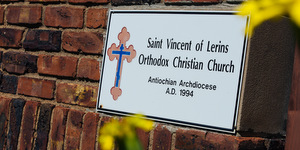About
What is the Orthodox Church?
It is the original Christian church as founded be Jesus Christ in the first century a.d. From that time until today, the Orthodox Church has continued in the same faith, neither adding to nor subtracting from the faith of the early church.
Although there were some small divisions, for the first 1000 years the large majority of Christians were united in one church. This church grew and spread into many lands, carrying into them the faith as taught by Christ and his Apostles.
The Schism
In the mid 1000’s there was a rupture in the unity of the Church. The church at Rome adopted new beliefs different from those of the first millennium of Christianity become what is know as the Roman Catholic church. The Orthodox Church continued in the faith of the church fathers.
One of the major changes occurred when the Roman Catholic church added the phrase “ and the Son” (otherwise known as the filioque) to the Nicene Creed; thus changing the whole implication of the belief in the nature of the Holy Ghost. Later, they also added concepts such as indulgences and purgatory, neither of which are found in the teachings of the early church.
The Reformation
These changes to the faith were some of the causes of the Protestant Reformation. The Protestant leaders set of to “re-form” or “purify” the faith. However, they had no blueprint on how to proceed, which led them to “purify” based oftentimes on personal opinion. We can see this by looking at the huge number of different Protestant groups that exist today. Each has its own interpretation of the church, its beliefs and teachings, but none contain all that the early church believed and taught.
The Orthodox church is:
Sacramental
The Orthodox Church is a sacramental church. Sacraments are how the church puts into action the teachings of Christ. The most important sacrament is the Eucharist, or Holy Communion. Others include Baptism, Chrismation, Holy Matrimony, unction, Confession and Ordination.
In Orthodoxy, the sacramental nature of life is the reflection of God in all things. These sacraments memorialize the actions of Christ. Sacraments form a link between man and God, and also link us with the church throughout its history.
Traditional & Scripture based
The teachings of the faith come to us by way of Scripture and Tradition. These two things are the guideposts the church uses to find its way. The Seven Ecumenical Councils, were gatherings where many of the great bishops of the church illuminated and expanded our knowledge regarding the Mysteries of the faith, never going against Scripture and Tradition.
These councils clarified those teachings that were in dispute among the faithful. They did nor invent new teachings. The Orthodox Church does not create novel doctrines, nor does it discard old doctrines under the excuse that they are some irrelevant.
Liturgical
Often, when people speak of the Orthodox Church, they refer to it as the “Eastern” Orthodox Church, pictured an exotic service conducted in Russian or Greek they will not understand. However, many Orthodox services are now conducted in English. Orthodoxy also conducts its services using both Western and Eastern liturgical traditions. There are “Western” Orthodox churches that conduct their services using ancient western liturgical rituals and practices.
These are currently two Western liturgies in use in the Orthodox church. The first is the Liturgy of St Gregory, more commonly known as the Gregorian Rite. This liturgy had its origin in the early Roman church and although it has had a few alterations is very similar to the liturgy of the Roman Catholic church until the 1960’s. The second is the Liturgy of St Tikhon. This liturgy also its origin in the Gregorian Rite. Its more recent history comes via the Anglican Book of Common Prayer. In 1904, the liturgy of the 1892 American Book of Common Prayer, with some corrections, was sanctioned as a vail Orthodox rite by the Synod of the Russian Orthodox Church.
The Orthodox church contains the fullness of the faith of the church founded by Jesus Christ It has continued in the Scripture and Tradition of the one true Church.
The Sacraments of the church allow us to put this faith into practice. The Orthodox Church authorizes this faith to be expressed in several different liturgies allowing for cultural and historical differences among peoples.
If you are interested in the Orthodox faith and would like more information, please contact your local Orthodox Church or Priest.

